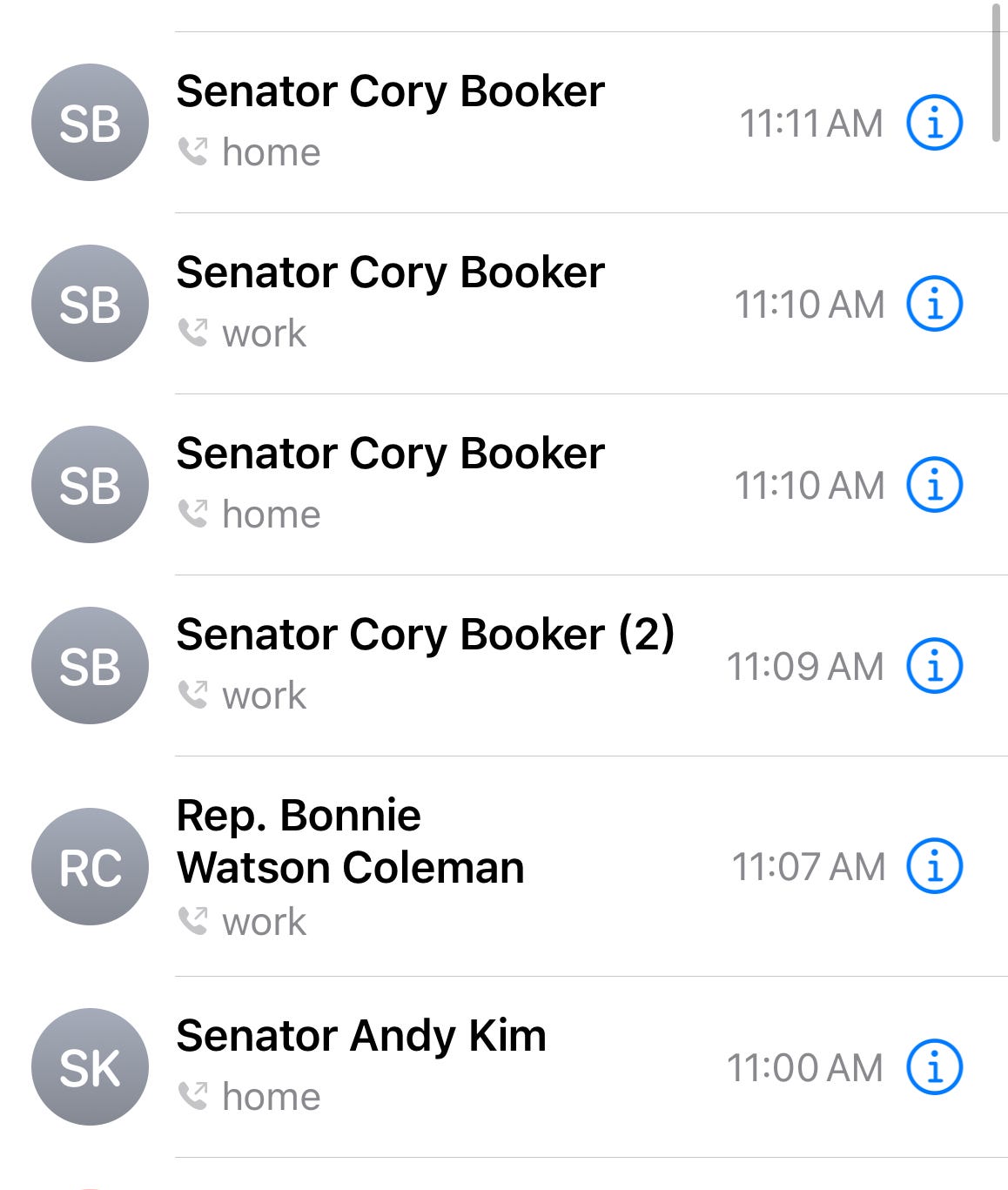Using your voice as an antidote to despair
Why you should and how you can call your members of Congress, even if it feels a little awkward...
A lot of people may not know that my advocacy didn’t begin when my disabled child was born, or even when I did research with foster families and disabled kids in China. Rather it was honed by my work in Washington, DC, fresh out of college, with a faith-based citizens grassroots movement against hunger, called Bread for the World. It was there that I first learned the value of programs like Medicaid, programs that support poor and hungry people by providing healthcare, childcare, and community care, but programs that also now make it possible for my disabled daughter to attend school, and even live at home with private duty nursing support.
It was there that I also learned that advocacy is part of the biblical and Christian tradition, that religious charity in the United States isn’t as generous as we often imagine or hope (federal and state programs serve far more people), and that Jesus definitely had a political agenda—he had no problem speaking out, speaking up, and siding with vulnerable people.
It was there that I also learned that we as American citizens, Christians or otherwise, ought to have a voice, given that we have a representational form of government. So I spent that year with Bread for the World teaching people how to write letters and call their members of Congress. Back then (in 2004) we taught that it only took eight letters to bring an issue to the attention of a member of Congress. The specific statistic and the tactics (many people no longer write handwritten letters, but they still work!) may have changed, but the point is that staffers in the offices of members of Congress regularly answer phones and record the comments they receive on issues.
Are they really listening? Do they ever call back?
Well, yes, in fact, they are, and yes, they do.
I know, because between 2016-2017, I called my Republican member of Congress, Leonard Lance, nearly every week about the threats to Medicaid under the Trump administration. I sent letters, thanking him for his service and urging him to support services for disabled people and their families. And after about a year or maybe over a year of my advocacy, I received a call out of the blue. A call from a 202 number, from Washington. It was Representative Lance calling to tell me he’d been getting my letters and phone calls. He asked about how my daughter was doing, and although we didn’t agree on everything in that call, he told me he would not be pursuing cuts to Medicaid, precisely because he did and does care about families like mine.
Now, this is kind of a miracle story.
And I know it wasn’t just my voice that made a difference. And calling isn’t the only thing that can—there’s lots of ways we can advocate for what we believe in. I also know people who have called and do call for years and years and years, and no one calls back.
But sometimes they do. And often they are listening. And it is often yours or someone else’s story, however seemingly small and meaningless, that can make a difference to a human being on the other end of the phone. Indeed, I think Rep. Lance somehow noticed my name because he has Princeton connections and I’m a Princeton professor, he clearly knew I had a daughter, and those were the things we began talking about, those were the things he could identify with that brought us together, as people.
Snowy scene in New Jersey. My photo.
There is so much trying to drive us apart as people these days. I know it feels vulnerable to call and share your story, but the people on the other end of the decision making, need to know the real people who are afraid, affected, and anguished. And if we turn away from the things that are hurting people, especially withholding our humanity when it could actually make a difference, well, we certainly cease to make a difference. We may even relinquish small bits of our humanity, subtly sliding into despair.
So if you’re looking for a small, yet powerful way to use your voice and you don’t know where to start, I’ve put together a brief guide of how to prepare and how to call. Pass this guide onto others you know and ask them to share their stories. A few weeks ago, I wrote a piece about what a boon allyship is to people who are feeling weary. And this is one practical way you can be an ally. All you need to do is pick up the phone.
My call log from my morning commute today.
How to call your members of Congress
Step one: Figure out your members of Congress.
Type your address into www.congress.gov to figure out your members of Congress. You have two senators and one representative.
Step two: Add each of your members’ phone numbers to your contact list in your phone. Bonus: you can go to their pages and add a local office number as their “home” number and the Washington number as their “work” number. (This is worth doing, because sometimes the Washington line can be difficult to get through or the mailbox can be full, and it’s good to have another line to try.)
Step three: Pick a day of the week, preferably toward the middle of the week, like Wednesday to call, and call during business hours. (It helps to pick a day toward the middle, because by that point there may be something to call about, and there also may be time for them to do something about it, but it really doesn’t matter all that much.)
Step four: Pick a regular time to call. I like to call on my way to work, because it’s easy. You can put an alarm in your phone.
Step five: Pick an issue you want to call about. For me, I’m really worried about cuts to Medicaid right now, so I recently called about the federal funding freeze and and about proposed cuts to Medicaid, but you could call about an ICE presence in your neighborhood and immigration concerns, or healthcare for trans kids and people, etc. If you’re having trouble following the issues, you can download an app like “5 Calls” that will summarize the issues. But you don’t really need to know much to call…see next step.
Step six: Rehearse your comments. Plan your comments in 3-5 sentences. You can write them down if you want.
Sentence 1: Start with your name, town you live in, and say that you’re a concerned constituent.
Sentence 2-4: Tell them what issue you’re calling about and why it matters to you. This is where you can expand if you have a personal story or a strong reason for caring. It helps to use feelings statements, for instance, “I’m worried about proposed cuts to Medicaid, because my daughter is disabled and Medicaid helps support the nurse who helps her go to school and even live at home rather than in an institution.” You may not always have a personal story, but you likely know someone who is affected, and it can be just as effective to share about someone you care about.
Sentence 3-5: Finally, state what you wish the Congressperson would do: for instance, “I want you to oppose any cuts to Medicaid that may come as the result of an executive order or a bill introduced in Congress.” When there are actual pieces of legislation to be voted on, this usually amounts to asking them to vote the way you want them to. And even if you think you know how they would vote, you need to call, because sometimes people don’t even show up to vote, which is infuriating!
Step seven: Call all three members!
Press the option that asks to speak to a staffer. Usually the person will pick up and they may even ask you for your name, address, town, and contact information. This helps them log the call, so please provide it! If they don’t ask, just go ahead and start with sentence 1. Then, they will ask for your comment and you can proceed with your sentences 2-5 above. Then, they’ll thank you for your comment.
In my experience, staffers are rarely rude or ask follow up questions, you simply log your comment and hang up. Sometimes you leave a message, and sometimes the voicemail box is full. If that’s the case, try again tomorrow and let them know. That’s usually a good sign! It means people are calling, but make sure you do your best to get your comment through.
Step eight: Rinse, repeat, resist.
Let me know if this was helpful in the comments, what I missed, or if subsequent posts would help. And thank you for calling! Thank you for using your voice!




Thanks so much for this!
Thanks so much for this helpful information, Erin. Deeply appreciate it!